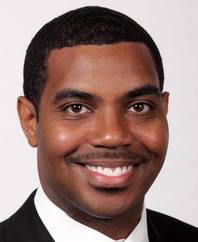Sunday, April 3, 2011 | 2:01 a.m.

Bill Raggio

Pete Goicoechea

Steven Horsford
Sun coverage
Sun archives
- Horsford doggedly attacks Sandoval’s budget cuts (3-29-2011)
- Horsford to lawmakers: ‘Talk about our revenue needs’ (3-28-2011)
- Senator wants teacher training program cut; money found in budget (3-28-2011)
- Brian Sandoval proposes budget fix; Democrats continue to hammer spending plan (3-28-2011)
- Counties fearful of Sandoval’s budget (3-8-2011)
- Republicans issue list of demands to be met before they'll talk taxes (3-3-2011)
- Democrats say Sandoval budget has $325 million hole (2-24-2011)
- Sandoval’s budget relies on at least one fee increase (2-10-2011)
- Gaming, mining industries become early targets for taxes (2-8-2011)
- Sandoval will need to write in loophole to pass budget (2-5-2011)
- Senior programs not spared from cuts in Sandoval budget (2-2-2011)
- Gov. Brian Sandoval’s budget means job, service cuts for Clark County (1-26-2011)
- State budget plan heavy on cuts, light on solutions (1-25-2011)
- Soft words during State of the State hide Nevada in pain (1-25-2011)
- Teachers not pleased with most of Sandoval’s speech (1-25-2011)
The Legislature’s tried and true way of wrangling budget fights to a close may be abandoned this session, as Democrats search for a way to crack the anti-tax veneer of the two Republican caucuses.
Traditionally, legislative leaders operate on a dual track, holding budget hearings in public while key lawmakers work behind closed doors to build a leadership consensus on what to cut and how to fund what can’t be cut.
The “core group” negotiating system is fraught with the typical stops, starts and stalemates that characterize difficult bargaining.
But with the session almost at the halfway point, some leaders are saying the core group process is not working this year.
“They just sit there in core. They just sit there!” one frustrated Democrat said last week of Republican legislative leaders.
“What’s the point of even having core group meetings when they just hand over this long list of things they want us to sell our souls for, and then they might lift the sunset.”
Republicans have presented a list of demands that includes limiting collective bargaining rights, cutting retirement benefits and changing construction defect laws. If Democrats play ball on their reform demands, Republicans say they would be willing to lift the sunset on the 2009 tax increase.
Another Democrat who has participated in core group meetings for several sessions agreed this stalemate is unlike others that have marred past budget negotiations.
The system worked well when Jim Gibbons was governor. Legislative leaders knew they were driving the train with no interference save a veto threat.
Now, Republicans feel empowered by Gov. Brian Sandoval, who easily won office on a promise not to raise taxes and to do the political legwork to see his budget passed.
That dynamic has hardened Republican lawmakers’ bargaining line.
And it’s not just Democrats who see the rapidly approaching demise of the core group meetings.
“Clearly the lines are drawn this session and core isn’t going to make the difference,” Assembly Minority Leader Pete Goicoechea, R-Eureka. “It’s definitely going to be caucus votes this time.”
One of the biggest impediments to the core group approach is the absence of former Senate Republican leader Bill Raggio of Reno, who retired just before the session began.
“Without Raggio, there is no master negotiator,” one Democrat said.
Raggio largely dictated the negotiations, exerting fierce control over his caucus. Through sheer mettle he forced legislative leaders to accept a sunset provision on the 2009 tax increase — a sunset that Senate Majority Leader Steven Horsford, D-North Las Vegas, angrily fought and still regrets.
Horsford has never felt comfortable adhering to Raggio’s leadership mold, favoring a more publicly confrontational approach.
But at least one Democratic leader acknowledged privately that the session-long strategy of pummeling Republicans with town-hall meetings, emotional testimony about budget cuts and attempted political pressure in key districts isn’t having the desired effect.
Quite the opposite. Some Republican lawmakers seem to have become inured to the tears and angry recriminations from constituents and have openly complained about having to listen to more testimony about cuts to education.
The intransigence of the Republicans has Democrats looking for some way to rock the process.
“We’ve got to find some way to shake them up,” one Democrat said.
Last week, Horsford held a two-hour budget hearing before the entire Senate. At the end, he warned that lawmakers would have to leave “ideology and pledges” at the door and reach a compromise.
“If not, it means doing business in a totally different way,” he said.
Democrats don’t appear to have found that yet. Some think they’ll have to resort to flipping swing Republicans, rather than negotiating with the caucus.
Some say the process needs to emerge from the backroom. But hope appears dim for those expecting a more public process this session. To have any chance, the process of flipping individual lawmakers would have to take place in secrecy.
And several leaders acknowledge that quiet negotiations among leadership could again become a necessity.
“In the end you’re not going to be able to bring 42 of us down there to talk about where are we going to go,” Goicoechea said.

Join the Discussion:
Check this out for a full explanation of our conversion to the LiveFyre commenting system and instructions on how to sign up for an account.
Full comments policy